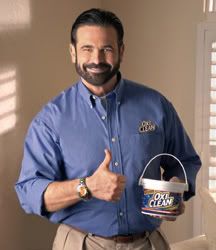
I always get a kick out of commercials trying to sell you something; in fact, television commercial superstar Billy Mays supposedly went to the same undergraduate institution that I did, though I can't confirm it. Though only now did I notice the language that they use in the commercials is economically very misleading.
The usual plug: "Buy this product, get this other product-- a $X value-- free!" As an economist, of course, I'm thinking that value is subjective. Which leads the following deductions:
- If we've got a distribution of people that value the product at different amounts, only a small fraction will be placing that exact dollar value on the free goods. So at best, I'd say the commercial accurately speaks to a fraction of a percent of the population. It would also be speaking favorably to those who value the free goods more, in my opinion, since undercutting the value of it might elicit a stronger response from those who really value the goods a whole lot. ($40 value for the free jimmy legs?! No way! I'd pay $200 for those puppies!) Then again, by convincing the viewer they are getting something more valuable for free, it might induce them to buy if they don't have an opinion in the first place. So I guess it's an elasticity issue between those who know their preferences and those who don't and want to be told them.
Also, I'm not certain if you can ever unbundle the paid-for goods from the free goods (I don't think I've ever bought anything off of the TV), so marginal analysis is fruitless here. It would be interesting to have time when the free goods were available or not...that might give some better info the average societal value of these goods. Then again, the people calling are presumably looking to buy in the first place...you'd have a pretty severe selection bias. It'd work better in a store; how many would buy just the original goods for a price, how many more would buy the goods with the freebies added on. Again, the point is not that the goods have an actual value $X-- take that, labor theory of value!-- but what the average person might value it at. Which may or may not have any redeeming quality in and of itself, outside of being a bit more accurate.
- If accuracy is the goal in advertising-- and that's a stretch-- then a more accurate way of phrasing the free goods might be stating the cost of them. After all, they would have a computable dollar cost per good. I'm not sure that would attract many sellers, however. (We'll throw in 20 free wipers-- they cost us four cents each!)
- Even more accurate than using "value" would be to say what the goods usually sell for in stores. I think these commercials are actually trying to get at this aspect when they say "$X value." In fact, some of them even phrase it as such. (You'll see these inflatable laptops in stores for $2500!) But today's lesson: Do not make the mistake of confusing "sells for" and "value"-- there's a big difference between the two.
1 comment:
We just recently placed some of our junk in one of those self storage places. An advertisement mentioned that signing up would get us a "free gift worth $20." This had absolutely no bearing on us signing up, but when we actually got the free gift (a tool-box flashlight combo thingy), we saw, in huge red letters on the box, "MSRP: $15!"
Thought that was kinda funny.
Post a Comment